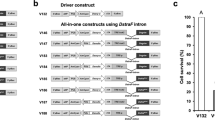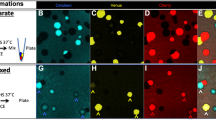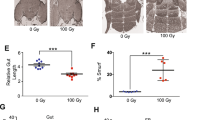Abstract
(1) Irradiated medium. Ionizing radiations are likely to find increasing use in industry for prolonging the useful storage-life of food. Before the method is declared safe and becomes widely acceptable, however, it is necessary to ensure that consumption of irradiated food is free from genetic ill-effects. Mutation rates have been shown to increase when bacteria are grown in ultra-violet-irradiated substrate1. Bacterial medium irradiated with ionizing radiations, however, has not been tested for its mutagenic effects. Information about the indirect genetic effects of ionizing radiations in higher organisms is scanty. Investigations of the cytological effects in root meristems of plants grown in X- and γ-ray irradiated potato mash2 and fruit juices3 have shown that the aberration frequencies in treated roots were strikingly higher than in corresponding controls. In order to test for similar effects in animals, these studies were extended to Drosophila. It was found that the rate of sex-linked lethals was increased slightly, but significantly, in the progeny of flies raised on irradiated food4. In view of the obvious importance of this observation it was thought necessary to re-test it, scoring both autosomal and sex-linked lethals. The former were included because it has been shown5,6 that feeding of unirradiated calf thymus DNA has a very specific and pronounced mutagenic effect on chromosome II of Drosophila, while the X-chromosome remains largely refractory to this treatment. Induced dominant lethality was also investigated in view of the chromosome breakage observed in plant material grown on irradiated medium. The results of these investigations are reported in this communication.
This is a preview of subscription content, access via your institution
Access options
Subscribe to this journal
Receive 51 print issues and online access
$199.00 per year
only $3.90 per issue
Buy this article
- Purchase on Springer Link
- Instant access to full article PDF
Prices may be subject to local taxes which are calculated during checkout
Similar content being viewed by others
References
Stone, W. S., Wyss, O., and Haas, F., Proc. U.S. Nat. Acad. Sci., 33, 59 (1947).
Swaminathan, M. S., Chopra, V. L., and Bhaskaran, S., Rad. Res., 16, 182 (1962).
Chopra, V. L., Natarajan, A. T., and Swaminathan, M. S., Rad. Bot., 3, 1 (1963).
Swaminathan, M. S., et al., Science, 141, 637 (1963).
Gershenson, S., C.R. (Dokl), Acad. U.R.S.S., 26, 601 (1940).
Mathew, C., Genet. Res., 6, 163 (1965).
Auerbach, C., J. Genet., 41, 255 (1941).
Natarajan, A. T., and Swaminathan, M. S., Indian J. Genet., 18, 220 (1958).
Parkash, O., Nature, 205, 312 (1965).
Parkash, O., Naturwiss., 52, 142 (1965).
Author information
Authors and Affiliations
Rights and permissions
About this article
Cite this article
CHOPRA, V. Tests on Drosophila for the Production of Mutations by Irradiated Medium or Irradiated DNA. Nature 208, 699–700 (1965). https://doi.org/10.1038/208699a0
Issue Date:
DOI: https://doi.org/10.1038/208699a0
This article is cited by
Comments
By submitting a comment you agree to abide by our Terms and Community Guidelines. If you find something abusive or that does not comply with our terms or guidelines please flag it as inappropriate.



